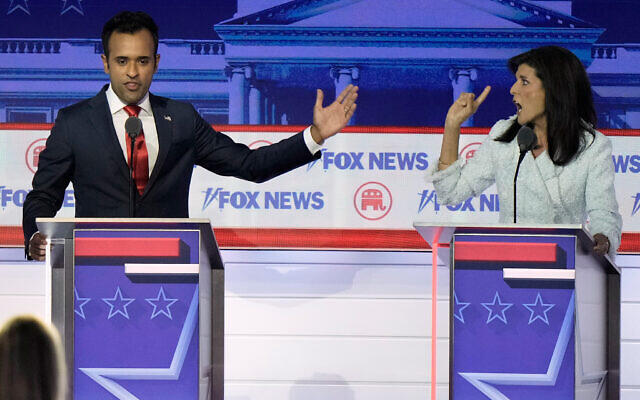GOP tension over Israel
For those of us who care about the strength and reliability of the US-Israel relationship, the result was unsettling.
It is widely agreed that Donald Trump won last week’s Republican primary debate by not showing up. But his absence also allowed us to hear more from the other candidates and therefore get a glimpse of how the GOP might approach its post-Trump future. For those of us who care about the strength and reliability of the US-Israel relationship, the result was unsettling.
Over the course of the evening, two possibilities emerged as a potential Republican foreign policy after Trump leaves the building. The first, personified most visibly by former Vice President Mike Pence and former UN Ambassador Nikki Haley, sounded like a restoration of the pre-Trump GOP’s vision for America on a world stage, an assertive and interventionist global presence that supports our allies and protects them against potentially harmful foreign aggression.
The alternative, represented by technology entrepreneur Vivek Ramaswamy and Florida governor Ron DeSantis, echoed a populist and isolationist brand of conservatism that had been largely dormant until Trump’s election in 2016 and has been building support within the party ever since.
The two sides clashed on Ukraine and China, but their most notable dispute was over Israel, where Haley attacked Ramaswamy for his proposal to end US aid to the Jewish state by 2028. Ramaswamy tried to change the subject by proclaiming his admiration for Israeli immigration and crime policy and his opposition to Iran’s nuclear aspirations. But Haley was relentless, blasting him for what she characterized as the abandonment of a loyal friend.
Ramaswamy exhibited a similar hands-off attitude toward Ukraine and Taiwan, reflecting a growing sentiment in the Republican Party that is more suspicious of an American global presence than at any time since shortly after World War II. But the grassroots conservative shift away from US international engagement has always exempted Israel, primarily because of the influential bloc of evangelical Christians within the GOP. DeSantis is an apt example of this dynamic, combining vocal support for Israel with a more ambivalent attitude toward Ukraine and other global hotspots.
But Ramaswamy, who like Trump possesses unusually acute instincts as to the passions of the most ardent Republican activists, appears to be willing to include Israel as a part of his broader disregard for the United States’ obligations to longtime allies. His argument is that expanding the Abraham Accords will provide such economic and security benefits that US financial support will no longer be necessary, an analysis which is either breathtakingly optimistic, hopelessly naive or intentionally oblivious. But Ramaswamy would not be taking such a position if he did not believe there would be a sizable audience for it.
For most of the last 30 years, the bipartisan threats toward Jews and the Jewish state came from predictable places on the furthest points of the political spectrum. The ultra-conservative extremists who surfaced in Charlottesville and elsewhere voice an ugly nationalism that gave voice to “Jews will not replace us” epithets. Equally extreme activists on the far left have asserted a “river to the sea” anti-Zionism so virulent that it oozes into antisemitism. This has left American Jews to balance an uncomfortable equilibrium, recognizing that Republicans may be more ardent in their support for Israel but that Democrats are more natural allies in domestic politics and culture.
But suppose that Ramaswamy’s sense of rank and file Republicans is accurate? What if he is correct in believing that the growing isolationism among conservatives no longer automatically exempts Israel? If he is right, then Israel and its supporters will soon be facing bastions of anti-Zionism at the ideological far left and right, with pockets of anti-Israel votes on both sides of the aisle in Congress.
If that’s where we’re headed, then many of the 70 Republican votes against increased aid to Ukraine this summer could manifest themselves against Israel as well, joining with a comparable number of Democrats in opposition to funding, military support and other expressions of American solidarity for Israel.
Ramswamy’s assertive debate performance means he is about to receive his media moment; we’ll see if he uses it to revise, deny or stand by his pronouncements on Israel.

No comments:
Post a Comment